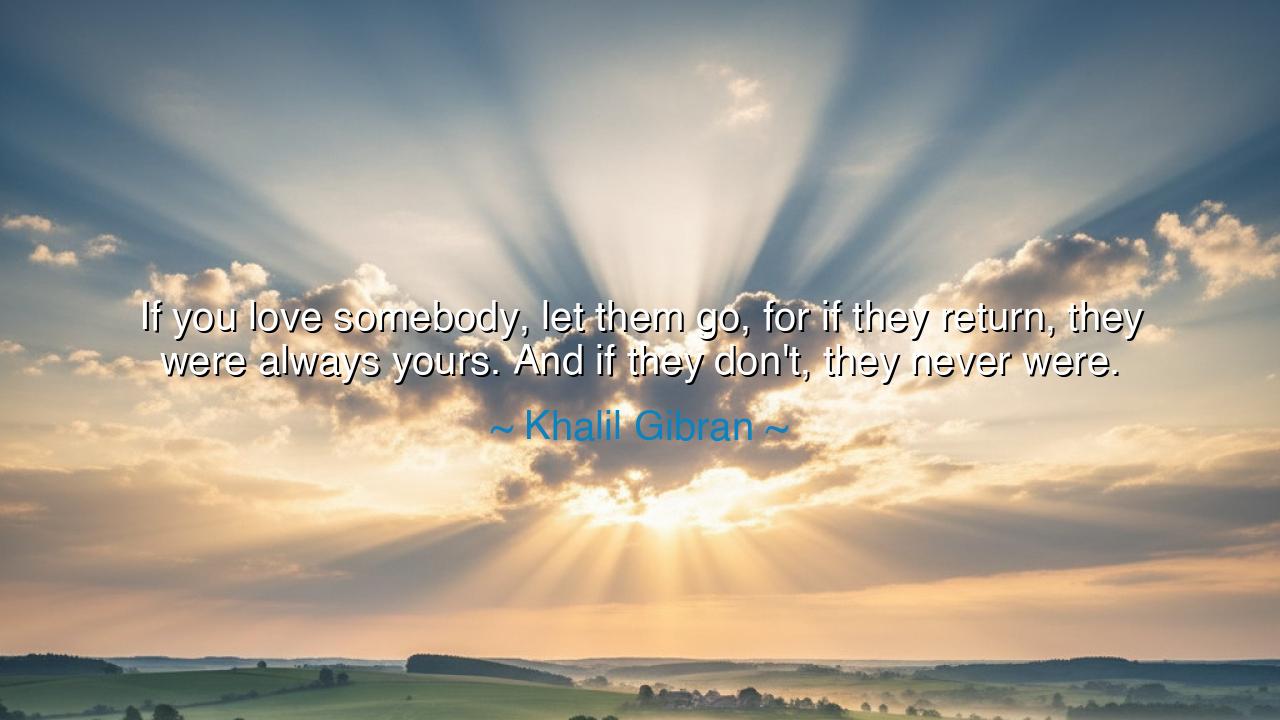
If you love somebody, let them go, for if they return, they were
If you love somebody, let them go, for if they return, they were always yours. And if they don't, they never were.






In the eternal voice of love and wisdom, Khalil Gibran, poet of the soul, once wrote: “If you love somebody, let them go, for if they return, they were always yours. And if they don’t, they never were.” These words, tender and timeless, flow from the heart of one who understood both the beauty and the ache of love. They speak not of possession, but of freedom — the freedom that true love requires. For love, Gibran teaches, is not a chain that binds, but a wind that must be allowed to move. To hold too tightly is to crush; to let go with trust is to allow destiny to unfold.
Gibran, born in the mountains of Lebanon and later a wanderer between worlds, knew much of parting and return. His life was shaped by exile and distance, by the ache of separation from homeland and loved ones. Yet through that distance, his understanding of love’s nature deepened. He saw that the love which endures absence and loss is not diminished — it is purified. Out of that experience came this truth: when love is genuine, it cannot be stolen by time, nor undone by distance. If it is meant to remain, it will return — not because it is forced, but because it is free.
To let someone go is one of the highest acts of love. It is to surrender the illusion of control and trust in the unseen laws of the heart. The one who truly loves must be willing to lose, for love that cannot risk loss is not love at all — it is attachment, fear disguised as devotion. Gibran’s wisdom teaches that love’s authenticity is tested not in closeness, but in separation. If the beloved returns, it is not by command but by choice, drawn by a bond that no distance could weaken. If they do not, then love has done its work and must now release the soul to its next journey.
Consider the story of Odysseus and Penelope, those ancient lovers separated by war and wandering. For twenty years they lived apart — he across the seas, she within the silence of waiting. Yet neither chained the other. Penelope’s love did not fade into bitterness; Odysseus’ heart did not forget its home. When at last he returned, it was not because she held him captive in memory, but because love had guided him through trial and tempest back to the truth of her. Their reunion was not the triumph of possession, but of endurance and trust. In them lives Gibran’s eternal message: what is truly yours will find its way back.
To love and let go requires courage greater than conquest. It asks us to master ourselves — our need for control, our fear of abandonment, our hunger for certainty. Yet those who have walked this path know the paradox: when love is freed, it grows stronger. Like a bird allowed to fly, it learns the sky, and if it returns, it brings with it the vastness of that freedom. Love that is held loosely lives; love that is held tightly suffocates. Gibran’s wisdom, then, is both gentle and stern — a call to trust that what is true will endure without your command.
This truth applies not only to lovers, but to all human bonds — to children as they grow, to friends as they change, to dreams that drift beyond our grasp. Life itself is an endless act of letting go. We are asked again and again to release what we cherish — not in despair, but in faith that all that is truly ours cannot be lost. The river may flow away, yet it returns as rain; so too do love and joy return in forms we cannot foresee. The heart that can let go is not empty — it is open, ready to receive anew.
Therefore, let Gibran’s words be a lantern to those who struggle with loss: do not clutch what must move on. Love bravely, and when the time comes, release gently. If they return, welcome them with grace; if they do not, bless them on their path. For the purpose of love is not to hold, but to honor. And in honoring, we find peace. The truest form of love is not in possession, but in trust — the trust that life, in its quiet wisdom, will return to us all that belongs to our soul.
And so, remember this, children of the heart: to let go is not to lose. It is to declare that your love is large enough to contain freedom itself. What returns to you, returns purified; what departs, was never truly meant to stay. For as Khalil Gibran, poet of eternity, teaches — love that is real cannot be taken, and love that is false cannot be kept. In this balance of heart and letting go, we learn the noblest truth of all: love, to be eternal, must first be free.






AAdministratorAdministrator
Welcome, honored guests. Please leave a comment, we will respond soon